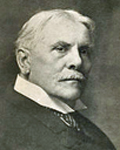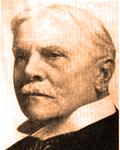RIGHTLY DIVIDING THE WORD OF TRUTH
Dr. Cyrus Ingerson Scofield Chapter 2:
THE SEVEN DISPENSATIONS "The purpose of this pamphlet is to indicate
the more important divisions of the Word of truth."
Dr. Scofield's Introduction and Chapter 1 of Rightly Dividing may be read at
http://www.messianicassociation.org/ezine25-cis.rightly-dividing.htm.
* In this pamphlet,
Dr. Scofield outlines some basic and very important distinctions in Scripture that must be acknowledged for proper understanding. Among these are distinctions that are of particular concern to the messianic community. Perhaps the two most important distinctions in this regard are those between Israel and the Church and between the various ages in God's dealings with mankind, the latter of which are often referred to as "dispensations," each of which has been initiated by a covenant that radically altered God's expectations of those with whom He made the covenant, and with those who subsequently entered into it. Many reject the doctrine of dispensationalism, often on the grounds that it was invented by C.I. Scofield, a late eighteenth - early nineteenth century American minister. By the same token, many have rejected the doctrine of salvation by grace alone through faith alone on the same grounds: It was invented by Luther. Of course, Luther didn't invent the doctrine; it was in Scripture all the time. Similarly, Scofield didn't invent dispensationalism; it was in Scripture all the time. He merely brought it to the notice of millions, particularly through The Scofield Reference Bible, first published in 1909. Furthermore, there were many before him that recognized distinctions between the ages and developed the concept to varying degrees, at as least as far back as Justin Martyr (A.D. 110-165) - virtually on the heels of Paul, who so copiously expounded on the subject. So there really was an unbroken line, or virtually unbroken line, of church leaders and theologians who recognized these "dispensations." In 1885, Scofield issued Rightly Dividing the Word of Truth, a pamphlet that "set the direction for his teaching and, through numerous editions, the agenda for a major segment of American fundamentalism."1
With this Shofar, the AMC is pleased to continue presenting the entirety of Rightly Dividing the Word of Truth, a concise aid that will help us in rightly dividing the word of truth (2 Timothy 2:15). - ed.
 | RIGHTLY DIVIDING
THE WORD OF TRUTH |  | 
C.I. Scofield
|
* The Scriptures divide time (by which is meant the entire period from the creation of Adam to the new heaven and a new earth of Rev. 21:1) into seven unequal periods, usually called dispensations (Eph. 3:2), although these periods are also called ages (Eph. 2:7) and days, as in day of the Lord.
These periods are marked off in Scripture by some change in God's method of dealing with mankind, or a portion of mankind, in respect of the two questions: of sin, and of man's responsibility. Each of the dispensations may be regarded as a new test of the natural man, and each ends in judgment, marking his utter failure in every dispensation. Five of these dispensations, or periods of time, have been fulfilled; we are living in the sixth, probably toward its close, and have before us the seventh, and last: the millennium.
1. Man innocent. This dispensation extends from the creation of Adam in Genesis 2:7 to the expulsion from Eden. Adam, created innocent and ignorant of good and evil, was placed in the garden of Eden with his wife, Eve, and put under responsibility to abstain from the fruit of the tree of the knowledge of good and evil. The dispensation of innocence resulted in the first failure of man, and in its far-reaching effects, the most disastrous. It closed in judgment: So he drove out the man. See Gen. 1:26; Gen. 2:16,17; Gen. 3:6; Gen. 3:22-24.)
2. Man under conscience. By the fall, Adam and Eve acquired and transmitted to the race the knowledge of good and evil. This gave conscience a basis for right moral judgment, and hence the race came under this measure of responsibility-to do good and eschew evil. The result of the dispensation of conscience, from Eden to the flood (while there was no institution of government and of law), was that all flesh had corrupted his way on the earth, that the wickedness of man was great in the earth, and that every imagination of the thoughts of his heart was only evil continually, and God closed the second testing of the natural man with judgment: the flood. (See Gen. 3:7, 22; Gen. 6:5,11-12; Gen. 7:11-12, 23.)
3. Man in authority over the earth. Out of the fearful judgment of the flood God saved eight persons, to whom, after the waters were assuaged, He gave the purified earth with ample power to govern it. This, Noah and his descendants were responsible to do. The dispensation of human government resulted, upon the plain of Shinar, in the impious attempt to become independent of God and closed in judgment: the confusion of tongues. (See Gen. 9: 1, 2; Gen. 11: 1-4; Gen. 11:5-8.)
4. Man under promise. Out of the dispersed descendants of the builders of Babel, God called one man, Abram, with whom He enters into covenant. Some of the promises to Abram and his descendants were purely gracious and unconditional. These either have been or will yet be literally fulfilled. Other promises were conditional upon the faithfulness and obedience of the Israelites. Every one of these conditions was violated, and the dispensation of promise resulted in the failure of Israel and closed in the judgment of bondage in Egypt.
The book of Genesis, which opens with the sublime words, In the beginning God created, closes with, In a coffin in Egypt. (See Gen. 12:1-3; Gen. 13:14-17; Gen. 15:5; Gen. 26:3; Gen. 28:12-13; Exod. 1: 13-14.)
5. Man under law. Again the grace of God came to the help of helpless man and redeemed the chosen people out of the hand of the oppressor. In the wilderness of Sinai He proposed to them the covenant of law. Instead of humbly pleading for a continued relation of grace, they presumptuously answered: All that the Lord hath spoken we will do. The history of Israel in the wilderness and in the land is one long record of flagrant, persistent violation of the law, and at last, after multiplied warnings, God closed the testing of man by law in judgment: first Israel, and then Judah, were driven out of the land into a dispersion which still continues. A feeble remnant returned under Ezra and Nehemiah, of which, in due time, Christ came: Born of a woman-made under the law. Both Jews and Gentiles conspired to crucify Him. (See Exod. 19:1-8; 2 Kings 17:1-18; 2 Kings 25: 1 -11; Acts 2:22-23; Acts 7:5152; Rom. 3:19-20; Rom. 10:5; Gal. 3: 10.)
6. Man under grace. The sacrificial death of the Lord Jesus Christ introduced the dispensation of pure grace, which means undeserved favor, or God giving righteousness, instead of God requiring righteousness, as under law. Salvation, perfect and eternal, is now freely offered to Jew and Gentile upon the acknowledgment of sin, or repentance, with faith in Christ.
Jesus answered and said unto them, This is the work of God, that ye believe on him whom he hath sent (John 6:29). Verily, verily, I say unto you, He that believeth on me hath everlasting life (John 6:47). Verily, verily, I say unto you, He that heareth my word, and believeth on him that sent me, hath everlasting life, and shall not come into condemnation; but is passed from death unto life. (John 5:24). My sheep hear my voice, and I know them, and they follow me: and I give unto them eternal life; and they shall never perish (John 10:27-28). For by grace are ye saved through faith; and that not of yourselves: it is the gift of God: Not of works, lest any man should boast (Eph. 2:8-9).
The predicted result of this testing of man under grace is judgment upon an unbelieving world and an apostate church. (See Luke 17:26-30; Luke 18:8; 2 Thess. 2:7-12; Rev. 3:15-16.)
The first event in the closing of this dispensation will be the descent of the Lord from heaven, when sleeping saints will be raised and, together with believers then living, caught up to meet the Lord in the air: and so shall we ever be with the Lord (I Thess. 4:16-17). Then follows the brief period called the great tribulation. (See Jer. 30:5-7; Dan. 12:1; Zeph. 1:15-18; Matt. 24:21-22.)
After this the personal return of the Lord to the earth in power and great glory occurs, and the judgments which introduce the seventh, and last dispensation. (See Matt. 25:31-46 and Matt. 24:29- 30.)
7. Man under the personal reign of Christ. After the purifying judgments which attend the personal return of Christ to the earth, He will reign over restored Israel and over the earth for one thousand years. This is the period commonly called the millennium. The seat of His power will be Jerusalem, and the saints, including the saved of the dispensation of grace, namely the church, will be associated with Him in His glory. (See Isa. 2:1-4; Isa. 11; Acts 15:14-17; Rev. 19:11-21; Rev. 20:1-6.)
But when Satan is loosed a little season, he finds the natural heart as prone to evil as ever, and easily gathers the nations to battle against the Lord and His saints, and this last dispensation closes, like all the others, in judgment. The great white throne is set, the wicked dead are raised and finally judged, and then come the new heaven and a new earth. Eternity is begun. (See Rev. 20:3,7-15; Rev. 21 and 22.) * ENDNOTES
1. W.N. Kerr, "Scofield, Cyrus Ingerson," Evangelical Dictionary of Theology, 1992 ed. *
Dr. Cyrus Ingerson
Scofield (1843-1921) was an attorney,
evangelist, Congregational minister and writer.
Rightly
Dividing the Word of Truth is
republished by permission of www.BibleBelievers.com,
where other fine articles
by Scofield and others may be found. |
*
Return to Home Page

|




